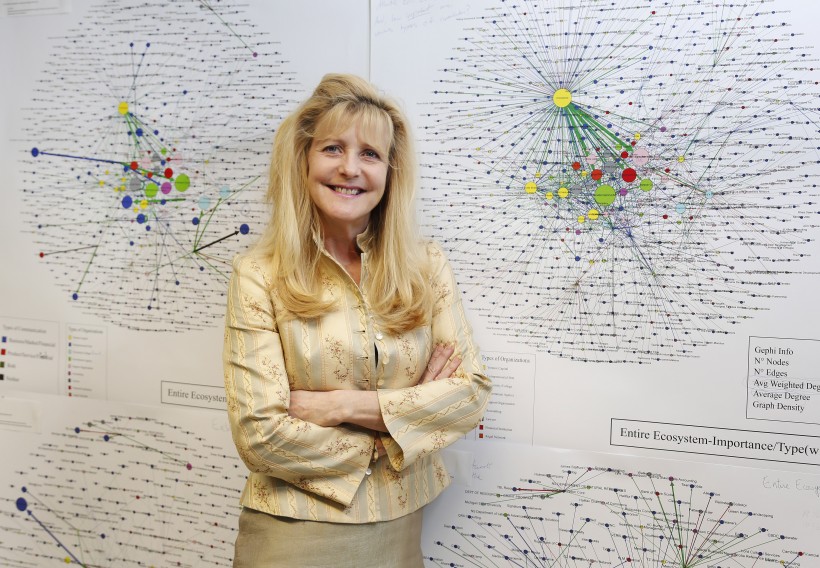Ellen Farrell was known for teaching and researching entrepreneurship at Halifax’s Saint Mary’s University long before it was fashionable. But the associate professor in management can still be thrilled and surprised: Her nomination for a brand new mentorship award has touched her, and the information being revealed by a unique study of the provincial government’s venture capital activities is interesting.
From her base at the university’s Sobey School of Business, Farrell said one of the things the complex venture capital study reveals is the high degree of interconnectedness between everyone involved in the region’s entrepreneurial community. On circular charts attached to an office wall, the entrepreneurial ecosystem has been mapped and the dense lines show numerous “knowledge transfers” between entrepreneurs, government agencies, investors, support groups, universities, media groups and others.
“Entrepreneurs need to innovate and the best way to create innovation is to share information and knowledge; there’s a lot of that here,” Farrell said. “It’s the nature of a geographically small area where entrepreneurs see themselves as supporting one another.”
Farrell has become well loved as a teacher over the course of her 18 years at Saint Mary’s, where she teaches entrepreneurs how to fund, structure and manage their companies. She has received many teaching awards, but says she is “pretty gratified, in fact, deliciously awestruck” to be named one of six national finalists of the 2014 BDC Mentorship Award, a new award from the Business Development Bank of Canada and the Canadian Business Youth Foundation.
She is also known internationally and is a regular guest at Boston’s prestigious Babson College Entrepreneurship Research Conference. She loves to teach but, like many academics, Farrell’s initial priority was research. Her focus was and remains early-stage equity finance, particularly informal and formal venture capital.
She did her PhD in venture capital at England’s Nottingham University in order to study with a great team. But, despite her high level of motivation, acquiring her PhD was difficult. “I thought I’d done my MBA so this would be no problem, but it was 15 or 20 times harder than my MBA.” But her early expertise in venture capital gave her an edge as an educator and empathy with her students.
She said she sees a rapidly growing interest in entrepreneurship among all groups of students, more of whom are running their own businesses as they put themselves through university. In class, professors teach the budding entrepreneurs how to think big.
“Once they’ve started and looked at the market potential and financials and the industry characteristics and the competition, it becomes increasingly empowering because students see, ‘This is how much money it would take to do, this is achievable.’ Lots of young companies regularly get $1 million to test their mettle. The potential is there if you can sell your great idea.”
As something of an entrepreneur herself — she helped develop three diverse businesses — Farrell is qualified to argue whether entrepreneurs are born or made. Her view is that everyone contains elements of the entrepreneur and education can develop that potential.
“You provide people with opportunities and experiences. They learn skills and techniques, such as confidence in selling, pitching, and it raises their confidence to a level where some say, ‘I can do this,’ although the failure rate is high as students underestimate the workload.”
Farrell also oversees the Informal Venture Capital Measurement Project, which measures business angel activity in Canada. She says informal investment is more common than people realize and that entrepreneurs can sometimes gain early investment from potential suppliers or customers.
“The entrepreneur’s network is really, really valuable. In class, I tell them it’s all about how you meet people and develop relationships.”
She finds it satisfying to see students blossom through entrepreneurship.
“Entrepreneurship is engaging. It builds confidence that turns young people into extremely competent individuals. I couldn’t be happier or prouder of them if I was their mother.”










